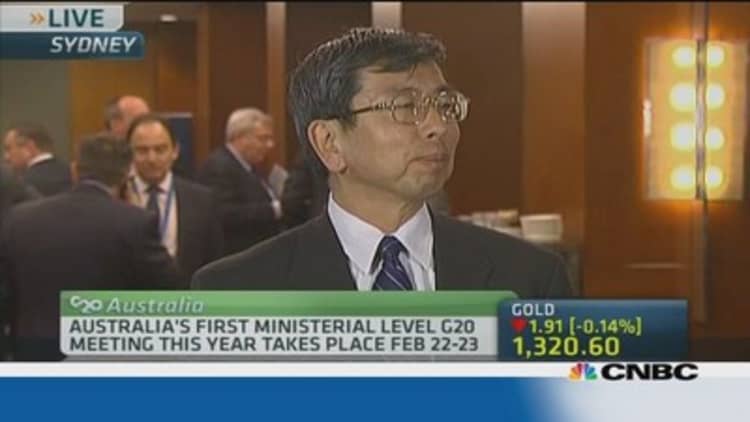
The economic currents buffeting Asia's emerging economies may spur comparisons with the crisis of the late 1990s, but the region is much better prepared this time around, the Asian Development Bank president told CNBC.
"Preparedness can support stability," Takehiko Nakao, the president of the ADB, told CNBC.
(Read more: Are EM companies the real debt worry?)
"Asian emerging economies will maybe weather this crisis, these difficulties better than many people could expect because they are more prepared for the ups and downs of economies today than 1997," he said.
Stocks, bonds and currencies in emerging markets suffered another bout of turbulence in the opening weeks of the year.
(Read more: Election year for emerging markets: What to expect)
The selloff in emerging markets was triggered by a combination of factors, from the U.S. Federal Reserve's pullback in its bond buying program – which has provided global markets with ample liquidity in recent years – to concerns over the growth outlook for China.
The "Fragile Five" – India, Indonesia, Brazil, Turkey and South Africa – markets have been among the worst hit given their vulnerabilities including twin fiscal and current-account deficits, falling growth rates and above-target inflation.
Over the past month, central banks in countries such as Turkey, India and South Africa have been forced to raise interest rates to stave off currency collapses and an exodus of foreign funds, although the moves haven't been entirely successful.
(Read more: Will emerging markets become a euro zone-style risk?)
Nakao notes several factors that can prevent the turbulence from turning into a full-blown crisis similar to the late 1990s, when emerging markets faced a domino effect across their economies as foreign-currency debt became too expensive after their currencies collapsed, stifling growth for years.
"They have pursued good macroeconomic policies, they have now a stronger banking sector and a better supervision of the banking sector," Nakao said.
In addition, the international community, including the ADB, the World Bank and the IMF, offer "stronger networks of safety net" if problems develop, he said.
(Read more: IMF calls for 'urgent action' amid EM crisis)
To be sure, he noted countries such as India and Indonesia face concerns that they cannot make economic adjustments in the lead up to elections.
"I think makes more difficult," he said. "But I hope economies including India and Indonesia can overcome those difficulties and pass through the policies."

Last month, the IMF also stressed the need for coherent economic policies and urgent action in some emerging markets.
(Read more: What happens in EM stays there, mostly: Goldman)
"The turbulence underscores the challenging situation that many countries face as a result of tighter external financing conditions, slower growth, and softer commodity prices," the IMF said last month.
It added that while many countries had "responded forcefully," coherent policies and good communication between affected economies were necessary. In addition, some countries needed "urgent policy action to improve fundamentals and policy credibility," it said.
—By CNBC.Com's Leslie Shaffer; Follow her on Twitter @LeslieShaffer1
—Correction: Nakao's quote on emerging markets has been corrected to "they have pursued good macroeconomic policies," from "they have passed good democratic processes."

